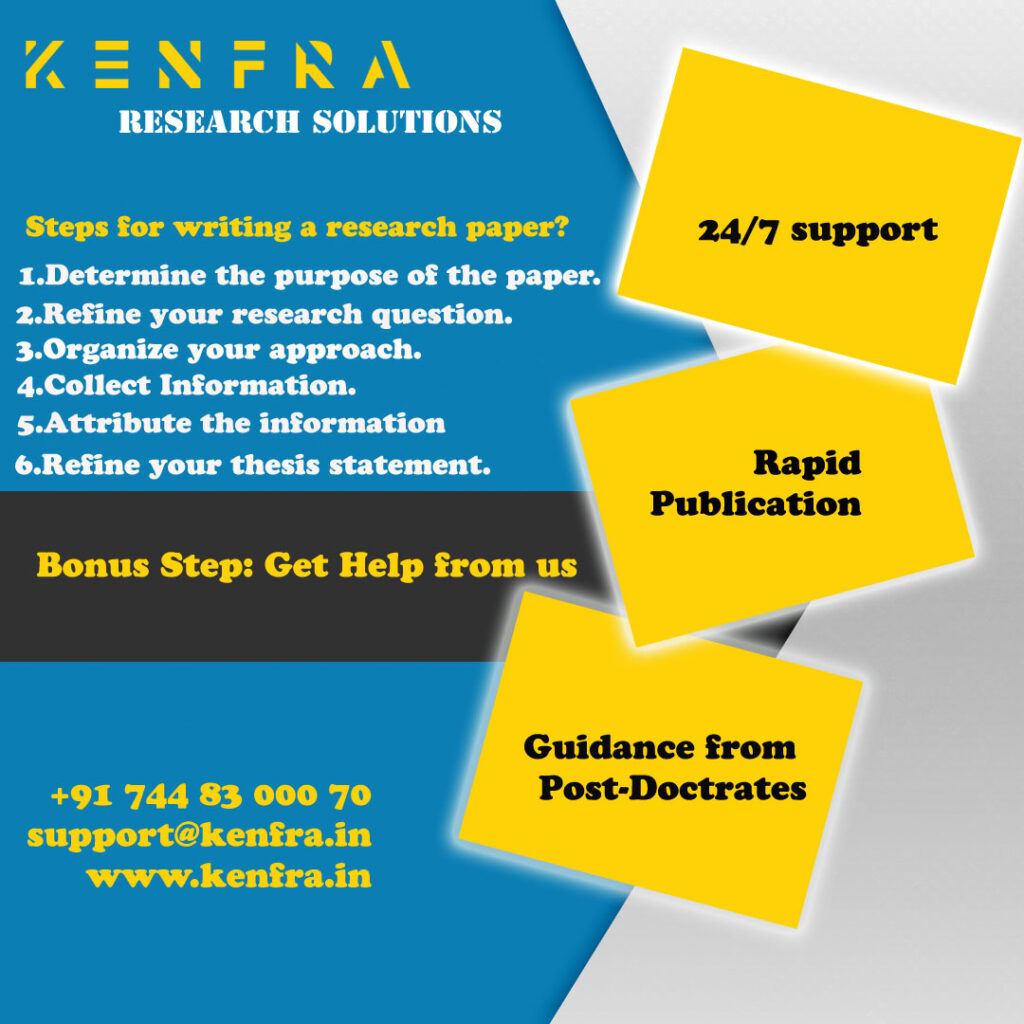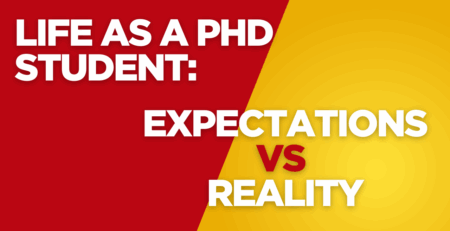Writing a Research Paper: A Guide
KENFRA Research Solutions2022-09-26T16:15:16+05:30Before you graduate from college, possibilities are you will have to write at least one research paper of the college level. If you’ve never written an excellent research paper before, it can be difficult. We’re prepared to assist.
This manual will help you through every step you need to take to write an outstanding research paper that will earn you the grade you want.
Here are the procedures and tools you need to write a solid research paper, along with a checklist you may use to ensure you wrote a quality document. Although it can be difficult, research writing can develop into a valuable skill for both academic and professional purposes with a little practise.

The Methods
You can produce a research paper using the stages below, starting with nothing more than an assignment or prompt and finishing with a well-written essay. The actions are:
Step 1: Familiarize yourself with the assignment.
Step 2: Select a topic
Step 3: Research
Step 4: Conduct research
Step 5: Create a thesis
Step 6: Create an outline
Step 7: Compose
Step 8: Content editing
Step 9: Correct Grammar
Step 10: Read your article again and submit your paper
1: Familiarize yourself with the assignment
Although it can seem simple, it is crucial to comprehend the requirements before you begin writing your research paper. Many students don’t complete this phase, and they later wonder why their paper—which they worked tirelessly on or were enthusiastic about—receives a poor grade. They frequently failed to read the instructions, which was the reason.
Examine the task in detail. Take a look at everything your educator has given you. Read the writing prompts, grading criteria, writing assignment, and any other materials you were given very carefully. Even highlighting and making notes about the work could be beneficial. Spend some time comprehending the specific nature of the writing assignment and the criteria for scoring it. Ask questions if you’re unsure. Before you even choose a topic, ask your instructor for clarity. You can then be certain that you are moving in the proper direction.
2: Select a topic
After you have a clear understanding of the requirements for your research paper, you must choose a topic. Although it may seem overwhelming, try not to get stressed out. Don’t stress about picking the ideal subject; writing about something you are interested in or passionate about might be quite useful. A contentious subject can often be excellent so that you can practise explaining opposing viewpoints objectively and, if necessary, defending one of them.
When choosing a topic for your paper, follow the instructions provided by your instructor. Choose a different topic if you’re having problems incorporating your favourite topic into the requirements. Writing on a subject that is appropriate for the task will make your life easier in the long run. You don’t have to adore the subject you’re writing about, but it is vital to be interested in it. Realizing that you have the chance to learn something new from this research writing project is also a fantastic idea. By the end of this process, you will have gained some expertise in the subject, but you don’t have to be an expert yet.

3: Research
And now for the research you have been waiting for! This step is somewhat adaptable because different people will conduct their research for a paper in various ways. But it’s critical to maintain concentration and move swiftly. You still have to compose your research paper, after all.
When conducting research, it’s important to bear in mind a few basic principles: 1) skim; 2) discover trustworthy sources; and 3) don’t disregard material. When conducting research, it’s important to bear in mind a few basic principles: 1) skim; 2) discover trustworthy sources; and 3) don’t disregard information.
Initially, skimming You don’t have to read every article about your subject ever written in its entirety. You probably can’t, in fact. Get used to swiftly reading through things. Gain the ability to recognise important arguments and points without getting caught down in reading everything.
Next, look for trustworthy sources. According to what you may have been told, you can utilise Wikipedia to compile research for a paper. However, you cannot rely on that as your sole source. To become familiar with a subject, discover keywords that can guide your study further, and swiftly comprehend vast amounts of information, you can use generic sites like Wikipedia. But you need to locate trustworthy sources for the data you utilise in your report.
Investigate further using the information you obtained through a Wikipedia article or Google search. Examine the article’s sources, use the terms from your online search to look up information in an academic database, or ask a specialist if the information you acquired is accurate and, if so, where you can locate a trustworthy source that makes the same claim. Just to be clear, while you can utilise Wikipedia as a starting point for your study, you shouldn’t list it as one of your paper’s main sources.
Don’t disregard information, to sum up. Any topic you wish covered in an article can be found. Did scientists just find out that octopus DNA is formed of extraterrestrial DNA? Are the spires on Disney World’s Cinderella Castle detachable in case of a hurricane? Did a cook serve George Washington tainted tomatoes in an attempt to murder him? All three of the aforementioned assertions can be found in articles, however it becomes evident when you look further that they are not accurate. It is not always true that something is a confirmed truth that you may utilise in your research just because one article claims it to be true.
Work at comprehending all the various theories and schools of thought surrounding your subject. You can accomplish this by reading a variety of articles, reading a book or article that provides an overview of the subject and takes into account various points of view, or by speaking with an expert who can go into greater detail on the subjec
4: Conduct research
What should you do with all of this information now that you have it? The focus of step four is organisation. Similar to research, everyone has distinct preferences in this area. Your assignment may also play a role. When it comes to arranging your research, a bibliography—literally, “book writing”—is useful. It is a list of the books, periodicals, and other sources you used.
If your teacher requires you to submit a bibliography along with your research paper (remember step #1; you should already be aware of the assignment by this point!), do so., make a bibliography that complies with the paper’s criteria. Consider how you would like to organise your research if you are developing one for yourself only. It could be beneficial to add websites to your browser’s favourites list or create a digital bibliography that enables you to link to the resources you have discovered. You might choose a printed list of your sources, or you might wish to organise your research paper on a table or the floor and noting down everything you have learnt that is important to your assignment on notecards or sticky note
5: Create a thesis
You’re prepared to express your own opinion, argument, or assertion now that you know what you’ve been asked to accomplish, have picked a topic that suits the assignment, conducted research on it, and arranged it. Your paper needs a thesis statement even if you are not supporting or denying any claims. A thesis is a succinct statement that you, the researcher and author, present to the audience as what you are attempting to explain or prove in your work.
Write a one-sentence response to the question, “What is your paper about?” as your thesis statement. The following illustrations could be the solution:
· It relates to the university’s rules for first-year student housing.
· In a previous post, I discussed Jane Austen’s Pride and Prejudice’s thoughts on marriage.
See, it wasn’t that difficult. But it’s crucial to keep in mind that this is only a beginning point. Many students stop there, and they later wonder why their professor gave their thesis statement a low mark. A thesis statement should be conclusive and not personal. Therefore, you might substitute phrases like:
Many institutions require first-year freshman to reside on campus. This keeps people out of trouble, improves grades, and enhances the possibility that people will finish school.
Marriage is viewed as a variety of things in Jane Austen’s Pride and Prejudice, including a social mobility tool, a mistake, and a successful union.
How do the first set of sentences and the second set of thesis statements differ from one another? Work to get rid of statements like “I think” and “My paper is about.” It can take a few tries.
Additionally, it’s crucial to avoid being too hazy. Don’t be hesitant to present your case firmly. Each of the examples above addresses a particular aspect of the subject, as you can see. Making ensuring that your argument is debatable is another essential component of writing a powerful thesis statement. That doesn’t necessarily imply that it’s contentious or strongly held, but it does imply that others might disagree.
Someone might assert, for instance, that humans haven’t had much of an impact on dogs, that forcing first-year students to live on campus isn’t a good idea, or that Austen’s Pride and Prejudice marriage is all about romance. (Another test for the debatability of your claim is whether or not Pride and Prejudice is a book. Yes. Therefore, the claim that “Pride and Prejudice is a novel written by Jane Austen” cannot be refuted does not serve as a thesis. It would be pointless to devote a whole essay to a fact that is so obvious.) Making sure your thesis statement is powerful and specific will help you write your paper effectively and obtain a decent score. You may check your thesis statement by asking yourself if someone might refute it.
It may be beneficial to consult your professor, a writing centre tutor, another dependable educator, or a mentor at this point after you have worked to develop a precise, debatable, conclusive thesis statement. Ask them if they believe your thesis statement, which you will use to guide you while you construct your essay, is a strong one.
6: Create an outline
Your assignment may affect how you write your outline, just like it does with a bibliography. If your teacher requested an outline from you, make sure it complies with the provided example, instructions, or specifications. Even if writing an outline is not compulsory, it can still be a useful tool while you construct your research paper.
Making an outline is essentially just a way to organise your paper. Avoid being overly formulaic, but it can be beneficial to adhere to rules and guidelines. If you wrote three- or five-paragraph essays in high school, it’s acceptable to utilise those same formats for a research paper in college. However, whatever structure you pick, make sure it makes sense for your paper. Three or five primary sections for your research paper could not make sense if your thesis only has two main ideas. Your paper will likely need three main sections, one for each of the objectives listed above, if the assignment requires you to introduce the issue, discuss several points of view on the topic, and then select and explain your own position.
Consider carefully what you are attempting to convey or explain in your research paper when you draught an outline to determine what format would help you do so in a concise, systematic manner. An opening and a conclusion are typically sensible, but what comes in between depends on the subject matter of your essay.
Thinking about weak forms of argumentation that you should avoid is a wonderful idea during the outlining stage of creating your argument. Take some time to review the most prevalent fallacies if you are unfamiliar with them; your grade may be on the line.
7:Compose
Finally, it’s time to sit down and compose your paper. Even while it might seem like you should have begun writing sooner, know that the effort you have done so far is significant. It will assist you in writing a solid, understandable, and engaging research paper.
Be less concerned with perfection as you write. Don’t stress about using the right grammar, using the right phrases, or coming up with the perfect title. As you edit, there is still time to make your research paper excellent. You just need to write right now.
Before you begin writing, it could be useful to review your research; nevertheless, avoid writing directly from your research. When you start writing, it’s simple to replicate ideas without actually producing your own work if you keep glancing back and forth between your paper and your sources. Trust the work you’ve already done and rely on memory while you write your research paper.
You are welcome to research a specific quotation or statistic, but for the most part, your thoughts at this point should be original.
Avoiding plagiarism will be made easier by using your own thoughts. Whether you intentionally used someone else’s words or ideas without giving them due credit or not, plagiarism occurs when you do so. Though it doesn’t have to be, this sounds frightening. If you adhere to the instructions provided in this manual, you can be sure that your essay builds on the concepts, words, and labour of others without stealing, copying, or plagiarising.
You must cite your source if you verbatim quote something. Put the quote in quotation marks and give its author credit. Additionally, you must include more details about the quotation on a Works Cited or References page. It’s always crucial to provide credit even if you paraphrase—that is, utilise someone else’s ideas but not their precise words—in your own work. There is no need for quote marks here, but it is crucial to identify the source of the concept.
You don’t have to cite the origins of an idea if it is widely accepted (generally accepted) and may be found without attribution in three or more reliable sources. For instance, Microsoft was founded by billionaire Bill Gates. That is a well-known truth; you may find it mentioned in a lot of reliable places. However, if the focus of your essay is on the causes of Bill Gates’ popularity, fortune, and success, you’ll need to acknowledge and mention particular facts and figures as well as hypotheses regarding why the Microsoft billionaire is so successful.
8: Content Editing
Now that you’ve completed your paper, give yourself a pat on the back. To get here, you’ve put forth a lot of effort. Then resume your work. Before submitting it, your document still has to be edited. Do you recall how you were told not to stress about being perfect? You don’t need to worry, but now is the moment to polish your paper to the highest standard.
Editing for content comes first. This necessitates considering format, coherence, phrasing, and duration. When you made an outline, you organised your document with great care. Does that structure still make sense once you’ve finished writing your paper? If so, that’s fantastic. What do you need to move around if not? Take a close look at the sentences you’ve written. Did you convey the message you intended to? Can you make your paper more understandable or clear? This is a wonderful time to reflect on Step 1 as well. Has your paper complied with all the requirements of the assignment? If not, how might you add the elements that are lacking?
Now is the opportunity to trim or lengthen your paper if it is too long or too short for the assignment. Just because your paper is too long, don’t simply delete the conclusion. To try to lengthen your essay, don’t waste time fiddling with the font size and margins. Be cautious and considerate when making these modifications. What should you cut if you need to remove something, and how can you rearrange your paper such that it still has a solid structure? Do not simply repeat or add words at random to your paper if you need to make it longer. Consider where you could add more or what you could change to make your paper coherent overall, develop the ideas you are presenting, or provide useful data.
After making all the necessary adjustments, read your document once again to ensure that everything makes sense. It is simple to leave out or erase a word, sentence, or paragraph when using a computer, especially when writing. Give your research paper to a friend, instructor, or mentor if you’re sick of looking at it, and ask them to read it and let you know what they think of the material.
9: Correct Grammar
It’s also crucial to proofread for grammar. Although it could seem difficult, there are many tools and resources available. If you’re confused of how to use commas, semicolons, or run-on sentences, consult tools like Grammarly or Strunk and White’s Elements of Style.
Editing for grammar may require several iterations, just like editing for content. It’s okay if you need to take a break. Even better, it can make you feel more concentrated when you return to your writing, which is essential for finding and correcting errors.

10: Read your article again and submit your paper
It’s definitely time for a rest once you’ve completed Steps 1 through 9. Give your paper a last read-through over the course of a day or two (or, if you’re pressed for time, an hour or two). If you have just gone through your paper on a screen so far, it may be good to print a copy and read it that way. While reading on your computer, you could catch errors or formatting difficulties that your eyes missed. It’s time to submit your research paper once you’ve read it one last time and verified that it adheres to all the requirements of the assignment.
Make sure to adhere to any guidelines provided on submitting your research paper. Give yourself enough time to investigate any problems as well. What will you do if your printer runs out of toner five minutes before class if you try to print your paper? Even while it is terrible, it is still something you could have avoided by going on with enough time to handle any issues that emerge before the deadline if your paper is due online at midnight and the wifi is down when you connect to submit your assignment at 11:58 PM. Your teacher will value and respect your preparedness, and it probably will have a beneficial effect on your marks.
Be sensible and responsible when asking for help from your instructor, but don’t be scared to do so. Send your teacher an email the day before the due date if you log on and discover that the location where you are supposed to turn in your assignment is closed or inaccessible. This will allow them to assist you in submitting your work on time. Just don’t count on them to assist you in the middle of the night, on the weekend, or right before a due date for an assignment. Some teachers might, but at that point you are just lucky. If you plan ahead and give yourself enough time to complete a project, you won’t have to rely on chance to determine whether or not your professor will be accessible to assist you when you email them.










Leave a Reply